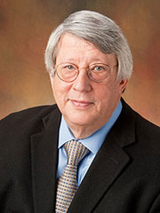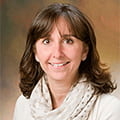
Greetings, fellow alums. This column is a little different than others. After 46 years of consummate pediatric practice at CHOP, Steve Ludwig, MD is set to retire from clinical practice this July. So, in true Terry Gross NPR fashion, on the eve of his clinical retirement, I sat down with Steve for an extensive interview which I have edited for print. Trust me, we covered a LOT of ground. I can’t thank Steve enough for agreeing to this, and personally, think that this might be the start of something new for this column! And now, reflections from Dr. Ludwig:
- What CHOP is like now compared to when you first started in 1974? In 1974 the hospital had just moved to its current location – there was one building with about 220 beds. Administration worried that we would not be able to fill the beds. The ED was pretty much run by residents with no attending there on nights and weekends. There were 14 bed positions, scant equipment. The child abuse team was just getting started. The out- patient clinics were all held on the second floor of the hospital – Groups A to E. The house staff was great then as it is to this day – bright, caring, dedicated, and fun. Now we have 7 buildings, 550 bed capacity, enormous research capacity, 3 urban primary care centers, and a network of primary care practices. The change over 45 years has been truly remarkable. There have been growing pains, but when I think of the number of children and families we have served I am humbled.
- What will you miss most about your clinical work? I think I will miss my primary care role the most. All throughout my years at CHOP no matter else I was doing, I maintained a primary care practice. It has been a great blend of physicians’ and nurses’ children and many families I met in the ED or in the hospital in-patient units. It is a very diverse group all with the same goals – keeping their children happy, healthy, educated, and out of trouble I have watched many children grow up some becoming physicians themselves. I have many second generation families. It is a kick to tell a child- “when I took care of your mother, she hated to get shots too”. Working with students, residents and fellows has been a very close second. Like patients they have taught me a lot and made it so it never felt like work. The joy of trainees is the greatest anti-burnout factor I know.
- What was most surprising about your career? I never imagined having the international opportunities that I have enjoyed. Growing up in West Philadelphia the furthest my family ever traveled was to Atlantic City (pre- casinos). My work has taken me to many countries around the world and afforded me the chance to make friendships with colleagues who have become part of my extended family. Hopefully I have spread some good information about better care of children and elevated the CHOP image around the world.
- What are you most proud of in your career? I think I am most proud to have had the vision about what needed to be developed within the field of pediatrics and to bring people together to make advances happen. It started with the need to improve emergency services for children. Working with others to create a new specialty by improving knowledge, skills, equipment, training, and research. I was honored with ABP certificate 001 and now there are over 2500 PEM Specialists. I was also proud to bring others together to create Child Abuse as a new specialty, as well as support the Academic Generalist and Pediatric Hospitalist movements.
- You have been a mentor to thousands. Why did you do that? And what do you think is most important in mentoring? I always saw mentoring as a way to give back and a way to expand what my professional impact would be. There is no greater pleasure than to see a mentee be successful and to go beyond what I was able to do. I always defined a mentor as “someone who will treat your career as his/her own”. I have tried to live by that standard and it has paid off many times over. I believe in leadership from behind.
- What do you look forward to in this next chapter? My credo has been “family first” for my family and the families of my colleagues and co-workers. Now with my daughters in their 40’s and my 4 grandsons 5-12, I hope to spend more time with them. I also enjoy writing, photography, gardening, and fishing. I have written some short stories about the privileges of being a pediatrician and would like to write more. Most of all to spend time with Zella who constantly supported me and often entertained you over our 51 years of marriage. I always tell her “grow old along with me- the best is yet to be.”

In conclusion, congratulations to Steve on a most remarkable, impactful clinical career. Stay in touch!!
Cindy

Greetings, fellow alums. This column is a little different than others. After 46 years of consummate pediatric practice at CHOP, Steve Ludwig, MD is set to retire from clinical practice this July. So, in true Terry Gross NPR fashion, on the eve of his clinical retirement, I sat down with Steve for an extensive interview which I have edited for print. Trust me, we covered a LOT of ground. I can’t thank Steve enough for agreeing to this, and personally, think that this might be the start of something new for this column! And now, reflections from Dr. Ludwig:
- What CHOP is like now compared to when you first started in 1974? In 1974 the hospital had just moved to its current location – there was one building with about 220 beds. Administration worried that we would not be able to fill the beds. The ED was pretty much run by residents with no attending there on nights and weekends. There were 14 bed positions, scant equipment. The child abuse team was just getting started. The out- patient clinics were all held on the second floor of the hospital – Groups A to E. The house staff was great then as it is to this day – bright, caring, dedicated, and fun. Now we have 7 buildings, 550 bed capacity, enormous research capacity, 3 urban primary care centers, and a network of primary care practices. The change over 45 years has been truly remarkable. There have been growing pains, but when I think of the number of children and families we have served I am humbled.
- What will you miss most about your clinical work? I think I will miss my primary care role the most. All throughout my years at CHOP no matter else I was doing, I maintained a primary care practice. It has been a great blend of physicians’ and nurses’ children and many families I met in the ED or in the hospital in-patient units. It is a very diverse group all with the same goals – keeping their children happy, healthy, educated, and out of trouble I have watched many children grow up some becoming physicians themselves. I have many second generation families. It is a kick to tell a child- “when I took care of your mother, she hated to get shots too”. Working with students, residents and fellows has been a very close second. Like patients they have taught me a lot and made it so it never felt like work. The joy of trainees is the greatest anti-burnout factor I know.
- What was most surprising about your career? I never imagined having the international opportunities that I have enjoyed. Growing up in West Philadelphia the furthest my family ever traveled was to Atlantic City (pre- casinos). My work has taken me to many countries around the world and afforded me the chance to make friendships with colleagues who have become part of my extended family. Hopefully I have spread some good information about better care of children and elevated the CHOP image around the world.
- What are you most proud of in your career? I think I am most proud to have had the vision about what needed to be developed within the field of pediatrics and to bring people together to make advances happen. It started with the need to improve emergency services for children. Working with others to create a new specialty by improving knowledge, skills, equipment, training, and research. I was honored with ABP certificate 001 and now there are over 2500 PEM Specialists. I was also proud to bring others together to create Child Abuse as a new specialty, as well as support the Academic Generalist and Pediatric Hospitalist movements.
- You have been a mentor to thousands. Why did you do that? And what do you think is most important in mentoring? I always saw mentoring as a way to give back and a way to expand what my professional impact would be. There is no greater pleasure than to see a mentee be successful and to go beyond what I was able to do. I always defined a mentor as “someone who will treat your career as his/her own”. I have tried to live by that standard and it has paid off many times over. I believe in leadership from behind.
- What do you look forward to in this next chapter? My credo has been “family first” for my family and the families of my colleagues and co-workers. Now with my daughters in their 40’s and my 4 grandsons 5-12, I hope to spend more time with them. I also enjoy writing, photography, gardening, and fishing. I have written some short stories about the privileges of being a pediatrician and would like to write more. Most of all to spend time with Zella who constantly supported me and often entertained you over our 51 years of marriage. I always tell her “grow old along with me- the best is yet to be.”

In conclusion, congratulations to Steve on a most remarkable, impactful clinical career. Stay in touch!!
Cindy